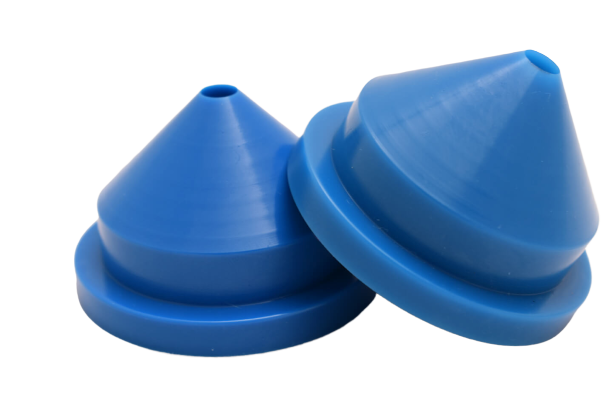What is Thermoset Polyurethane?
Thermoset Polyurethane is a versatile material that, depending on how it is formulated, can range in physical properties from soft and malleable to tough and hard. Chemically, these polyurethanes are formed from a variety of prepolymers, curatives, and additives. By varying the nature of these components, we can create numerous formulas and combinations of properties. Because of this versatility, polyurethanes can be custom tailored to suit a wide variety of applications.

General Structure & Manufacturing
General Structure of Thermoset Polyurethane
Polyurethane gains its excellent properties from the phase segregation of hard and soft segments that make up its overall composition. Some studies have measured the actual size of the hard segment. The overall hardness of the final polyurethane is based on the volume, ratio of hard segments to soft segments. While the soft segments are made up of the polyol portions of the polyurethane, the hard segments are chemically made up of the hydrogen-bonded sections. The hydrogen-bonded segments are composed of the reacted diisocyanates and curative sections. The polyurethane elasticity exits because of the stretching of the soft segments under strain. These hard segments can also stretch, but they anchor the entire matrix during periods of stress.
Cast Polyurethane Manufacturing
The Properties of Thermoset Polyurethane
More Load-Bearing Capacity At A Given Hardness
Compared to other elastomers of equal hardness, thermoset polyurethanes have greater load-bearing capacity in both compression and shear. This is an important advantage in many designs, and in some cases, this greater load-bearing capacity is what makes some designs possible at all.
Resistant to Abrasion
Where severe wear is a problem, polyurethane often outperforms rubber, plastics, and metals. In many applications, this abrasion resistance allows users to fabricate thermoset polyurethane products with less material than other elastomers require. Other benefits include lighter weight, longer life, reduced maintenance and replacement costs. Because abrasion resistance is a complex property that can vary with a number of factors, consult your PSI Urethane representative in selecting compounds for your specific requirements and application.
Highly Resistant To Impact
While conventional plastic materials tend to become brittle as they become harder, polyurethanes remain elastic and resist fracture even in very hard formulations. This great toughness makes thermoset polyurethanes ideal for parts that have to stand up to high impact or repeated impingement.
Wide Resilience Range
Unlike rubbers, thermoset polyurethanes do not have to be made soft to make them resilient, as hard polyurethanes can be as resilient as much softer materials. For shock absorbing applications, polyurethanes can be formulated with rebound values as low as 5%. For quicker recovery, or where high-frequency vibrations are a factor, they can be formulated with rebound values up to 75%.
Suitable For High-Flex Applications
Under repeated flexing, thermoset polyurethanes resist cracking as well as most other elastomers. However, since cracking of any elastomer can be reduced by making the part thinner, polyurethanes offer an important advantage as they can be used in very thin sections because of their great strength and toughness.
Flexible At Low Temperatures
Depending on the formulation, thermoset polyurethanes remain quite flexible even in Arctic-like temperatures. In addition, thermoset polyurethanes have proven remarkably resistant to thermal shock, and withstand sudden and drastic temperature drops without cracking.
Stable up to 120°C (248°F)
In special formulations, thermoset polyurethanes can withstand continuous use at 120°C (248°F) or higher. In standard formulations, polyurethanes are suitable for continuous use up to about 90°C (194°), although they can withstand temperatures as high as 120°C for short periods in certain applications. For advice on high-temperature applications, ask your PSI Urethanes representative to assist you.
Won’t Swell Or Deteriorate In Water
Thermoset polyurethanes remain stable even when immersed in water for very long periods. They absorb practically no water and show no negligible swell in volume even after prolonged immersion. In fact, these polyurethanes are used successfully in water-lubricated bearings, where a slight increase in volume would cause seizing.
To see the different types of Thermoset Polyurethanes, please see Choosing the Best Polyurethane Material.
For a comparison of Thermoset Polyurethane – Vs – Thermoplastic Polyurethane, please see Thermoset Urethane -Vs- Thermoplastic Urethane.
Ask Our Experts.
Contact us today to learn how we can meet your project’s requirements.
